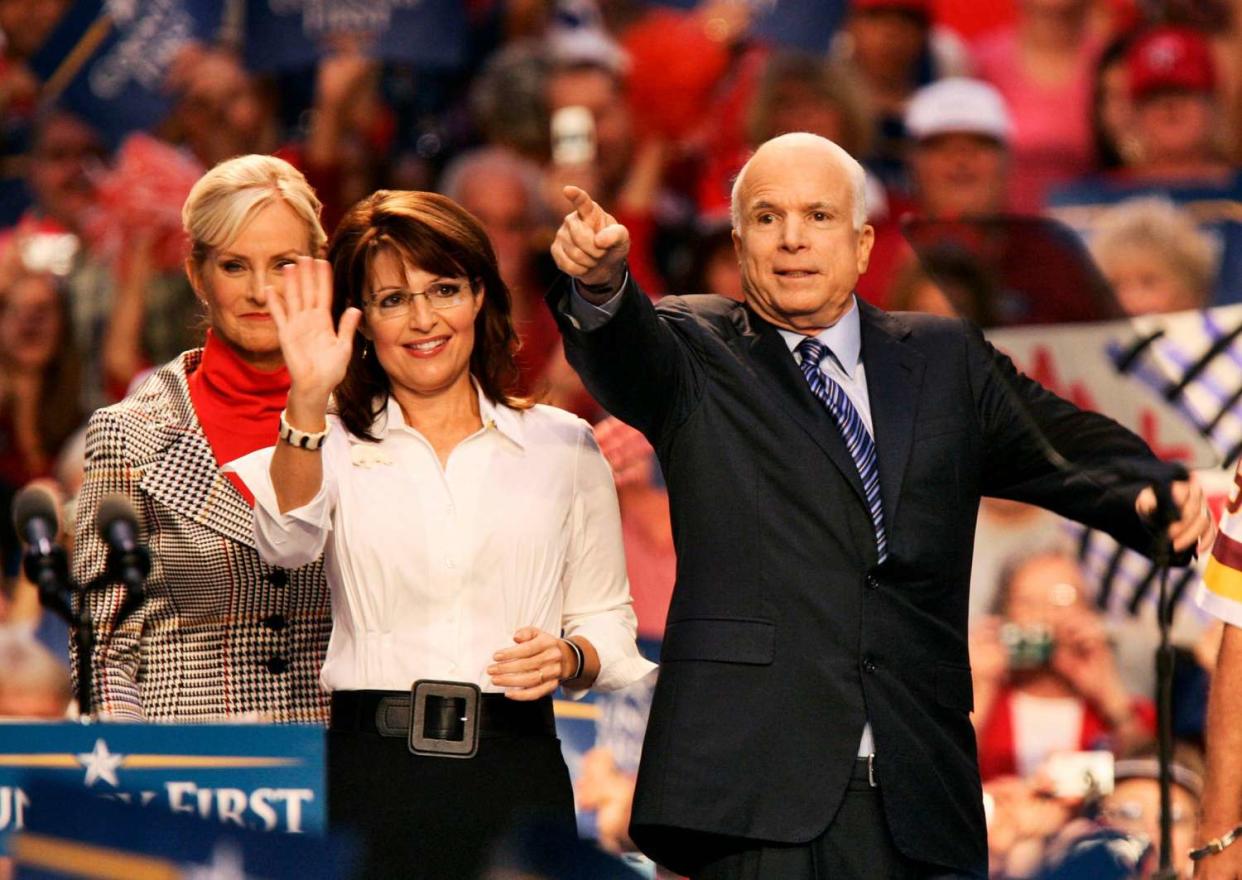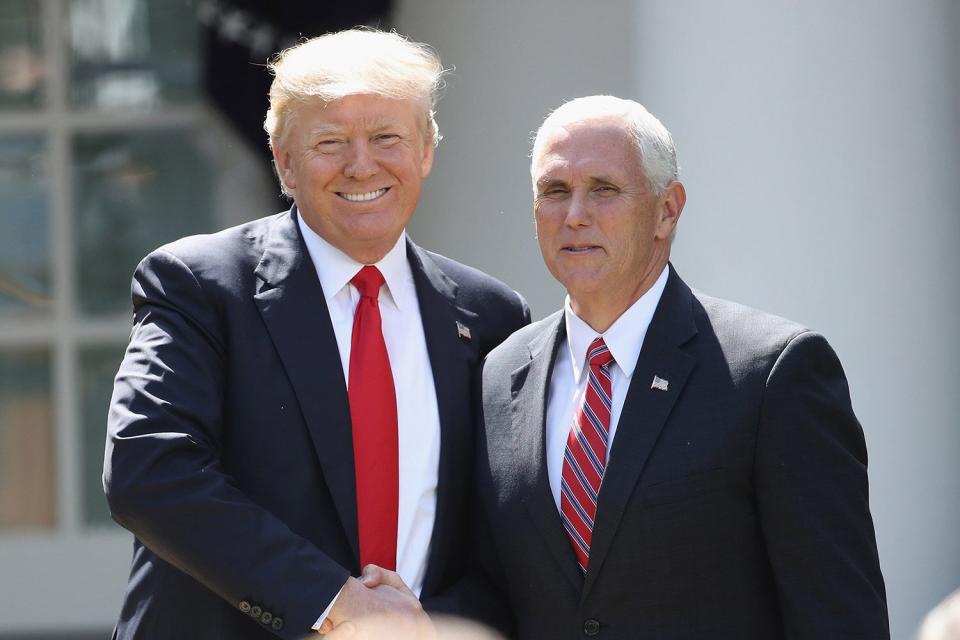'F--- It, Let's Do It': From McCain and Palin to Pence and Trump, New Book Details the Evolving GOP

- Oops!Something went wrong.Please try again later.
- Oops!Something went wrong.Please try again later.
- Oops!Something went wrong.Please try again later.
- Oops!Something went wrong.Please try again later.
- Oops!Something went wrong.Please try again later.
- Oops!Something went wrong.Please try again later.
- Oops!Something went wrong.Please try again later.
Sangjib Min/Newport News Daily Press/Getty From left: Cindy McCain (back) with Sarah Palin and John McCain on the campaign trail in 2008
When he selected then-Alaska Gov. Sarah Palin as his running mate in his 2008 presidential campaign, Sen. John McCain knew he was making a gamble. In fact, that seems to be part of why he chose her in the first place, mimicking someone rolling dice and saying, "F--- it. Let's do it."
This detail comes from the new book Insurgency: How Republicans Lost Their Party and Got Everything They Ever Wanted, by New York Times reporter Jeremy Peters, drawn from interviews with over 300 people including former President Donald Trump.
Peters writes of a scene in which McCain, following a one-on-one meeting with Palin, asked several of his senior aides and his wife, Cindy, to take a walk with him.
According to the book, published Tuesday, McCain was cautioned against the selection of Palin by longtime aide Mark Salter, who warned "that voters could see a Palin pick as discordant with the message of readiness and experience that the campaign had been focusing on as a contrast with Obama, a forty-seven-year-old first-term senator."
"There's worse things, John, than losing an election. You could lose your reputation," Salter told McCain, Peters writes.
Peters writes that McCain's campaign strategist Steve Schmidt told the senator: "What you've got to decide, is would you rather lose by seven going for it?"
McCain's wife, meanwhile, is said to have told her husband: "John, it's a gamble," to which he replied, "Well, I wish you hadn't said that."
From the book: "McCain, an avid craps player, balled up his fist and blew on it, then shook it like he was about to roll a pair of dice. 'F--- it,' he said. 'Let's do it.' "
The decision to select Palin initially injected new energy into the campaign and Palin proved broadly popular with conservatives. But her ensuing stumbles, especially around policy, became another burden on a foundering team.
Still, Peters writes, she ushered in a new type of politician — one that would ultimately evolve under the candidacy (and presidency) of Donald Trump.
Peters' book delves in to how voters have embraced Trump (and Palin before him) bucking the establishment in favor of a brand of charisma and controversy that many in the party had long craved.
It didn't come overnight, though, Peters writes.
Even some of those who would become Trump's political advisers had doubts about his candidacy early on, according to Peters. Steve Bannon — the investment banker-turned Hollwood producer who went on to co-found far-right website Breitbart News — initially scoffed at the idea of a Trump presidential campaign, laughing, "Of what country?" when asked to talk to the reality television personality about the idea.
RELATED VIDEO: The Melania and Donald You Don't See, According to Ex-Aide
About five years later, Bannon was convinced that Trump could win.
When Bannon saw Trump ascending on an escalator to announce his candidacy in a now-infamous press conference, he told Peters he thought he recognized something familiar.
From the book: "And when he saw Trump make his entrance that morning, he thought he knew exactly what he was seeing. That's Hitler!, Bannon thought, as the opening scene of Leni Riefenstahl's seminal work of Nazi propaganda, Triumph of the Will, flashed through his mind. He meant it as a compliment."
Elsewhere in the book, Peters recounts how many in the GOP resented that getting close to Trump often required getting access to those who, in previous election cycles, would have less sway over a president: his family members.
Former Rep. Denver Riggleman explained to Peters that gaining access to Trump often meant going through his daughter Ivanka.
"It was a conga line to try to get to her," Riggleman told Peters. "And I think they thought Ivanka was like their meal ticket to get into the inner circle. She would come in like royalty. And she was treated like an elected official. I just thought that was wrong."

Win McNamee/Getty Images Donald Trump and Mike Pence
RELATED: Jan. 6 Committee Requests Voluntary Interview with Ivanka Trump: 'You Were in the Oval Office'
As Peters details in his book, Trump was a new kind of candidate but one that campaign backers knew needed at least a hint of the establishment to lure longtime Republicans. That's where former Indiana Gov. Mike Pence came in — drawing in many of the longtime conservatives and evangelical Christians whose support Trump so sorely needed.
In the end, the two's relationship would sour, in spite of Pence's loyalty to Trump through some of the lowest points in his campaign and presidency.
Peters writes that Pence fumed as Trump publicly urged him to to "do the right thing" at the Stop the Steal rally preceding the Jan. 6, 2021, Capitol riots, telling Sen. Jams Inhofe, "After all the things I've done for him," in a reference to the president.
After Pence refused to block the certification of the election results for Trump (which the former president has repeatedly claimed, without evidence, were fraudulent), Trump turned on him. As did some of his supporters, who could be heard chanting "Hang Mike Pence" as they breached the Capitol.
Speaking to Peters for the book, Trump was dismissive of the chants, which he said were simply "an expression."
"I don't think they would have ever thought of doing it," Trump said.
Still, the former president told the author he felt Pence could have overturned the election: "And I wish he did. I think it would have been much better for the country. I also think it would have been better for Mike."
Insurgency is out now.

